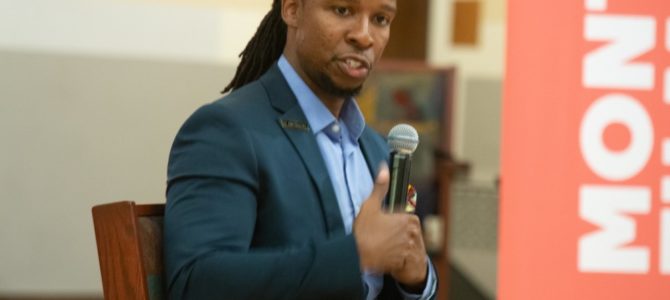
Ibram Xolani Kendi, born Ibram Henry Rogers to a black liberation theology-adhering tax accountant father and health-care business analyst mother, is the Prophet of Wokedom to whom the likes of Twitter’s Jack Dorsey pays $10 million to prove his virtue.
Kendi is a bestselling author across several categories, with an ever-growing list of scholarly credentials and awards. He is ubiquitous in corporate media, on college campuses, and at elite conclaves. Perhaps most significant of all, Kendi’s ideas are permeating the commanding heights of society, trickling into every aspect of American life, and therefore turning him into a transcendent figure.
Kendi’s Ideas Serve Today’s Ruling Class
On the first day of the Biden-Harris presidency, the administration issued an executive order claiming America suffers from systemic racism, manifested in “[e]ntrenched disparities in our laws and public policies, and in our public and private institutions,” and charged the whole of the federal government with “affirmatively advancing equity” (emphasis mine).
Numerous other government and private institutions are following suit. Oakland is testing a program to provide 600 black, indigenous, or otherwise non-white families—and only these families—$500 per month for 18 months. A Boston medical center is implementing a pilot program to offer “preferential care based on race” and “race-explicit interventions.”
Critical race theory, ethnic studies, and a panoply of related teachings such as the 1619 Project version of American history pervade U.S. schools, while their supporters wage a war on merit for diversity and against any teacher who would dare dissent.
More than 100 executives leading major businesses recently came together to discuss ways they could swing their weight to challenge voting legislation, including Georgia’s, that they dishonestly portrayed as discriminatory. It’s just one data point in the continuing trend of corporate America’s race left that accelerated during the post-George Floyd tumult of 2020.
Increasingly the rationale for all leftist policies is “antiracism,” the movement Kendi leads. One example is casting the filibuster as a “Jim Crow relic.” Although its participants may not know it, our ruling class is speaking in Kendian tongue, and aiming to realize his “antiracist” vision.
If America is fated to succumb to Kendiization—a term coined by a colleague that aptly captures our national moment—and live in a world of “antiracism,” it behooves us to examine the views of the man behind it.
What ‘Antiracism’ Proclaims as Gospel
Kendi’s “antiracism” is a Manichean concept, in which the world is bifurcated into racists and anti-racists. “[T]here is no in-between safe space of ‘not racist,’” he says, which fits neatly into the prevailing progressive-or-bigot binary.
How does one define racism and “antiracism”? According to Kendi’s magnum opus, “How To Be an Antiracist,” “Racism is a powerful collection of racist policies that lead to racial inequity and are substantiated by racist ideas.”
Racist policies are “any measure that produces or sustains racial inequity between racial groups.” Kendi cites as examples health-care policies or voter-ID laws that in his telling disproportionately harm minorities. He has said that even something as anodyne as a capital-gains tax cut is racist, since blacks are under-represented in the equity market.
Racial inequity is “when two or more racial groups are not standing on approximately equal footing,” Kendi claims. Kendi cites as an example disparities in homeownership rates between those of different races.
That is, to “antiracists,” equity is not about the rights or opportunities of individuals, but the outcomes of groups. Those outcomes, Kendi claims, are solely attributable to policy. As he writes: “if you believe that groups are equals…the only other explanation to persisting inequity and injustice, is power and policy.”
Racist ideas are not only those that “that suggest[] one racial group is inferior or superior to another racial group in any way,” but those that would challenge the idea that “racist policies” are necessarily the total cause of all “racial inequity,” given that “Antiracist ideas argue that racist policies are the cause of racial inequities.”
In short, it appears you would be charged as a racist if you challenge antiracism—for example, if you suggest that differences in outcomes between different people groups might be explained by anything other than racist policies rooted in racist ideas. You are also being a racist if you “support[] a racist policy”—as Kendi defines it—by your “action or inaction.”
Everything Is ‘Racist’ Now
Here are some other things Kendi deems racist.
— Standardized tests, which he calls “the most effective racist weapon ever devised to objectively degrade Black minds and legally exclude their bodies.” Per Kendi, the notion of any “achievement gap” between different peoples on standardized tests constitutes a “racist idea,” and the tests are to blame.
— Capitalism, which Kendi refers to as a “conjoined twin” of racism. Kendi states that the “origins of capitalism cannot be separated from the origins of racism,” citing colonialism and slavery. He also suggests that capitalism is racist by dubiously questioning if markets were ever level playing fields between the races, and whether blacks could ever compete equally with whites in the marketplace. He concludes: “to truly be antiracist, you also have to truly be anti-capitalist…And in order to truly be anti-capitalist, you have to be antiracist.”
— The broad American desire for a “race-neutral” country, which Kendi describes as “The most threatening racist movement,” and one more dangerous than “the alt right’s unlikely drive for a White ethnostate.”
— Assimilation, given that it is premised on the view that “there is something wrong with another racial group that needs changing or something right with our racial group that doesn’t need changing.” On this last point, one wonders: Does Kendi feel that his efforts to force Americans to assimilate into his desired culture of “antiracism”—one he apparently believes is superior to all others—is racist?
The chilling effect of Kendi’s divisive and reductive philosophy is obvious, although it becomes self-defeating to the extent it waters down the charge of racism. Essentially every person at one time or another will meet Kendi’s definition of racist. After all, if you are not actively working to achieve “antiracist” policy, you are being racist.
Solving Fake Racism With Real Racism
The policy part of Kendi’s “solution” to allegedly pervasive racism is perhaps more chilling. Since, as Kendi writes, “As an anti-racist, when I see racial disparities, I see racism,” the “antiracist” must devote himself to “fixing” these disparities. This “fix” is decidedly not colorblindness and freedom, but open discrimination and tyranny. Kendi asserts:
The only remedy to racist discrimination is antiracist discrimination. The only remedy to past discrimination is present discrimination. The only remedy to present discrimination is future discrimination.
He adds: “The defining question is whether the discrimination is creating equity or inequity. If discrimination is creating equity, then it is antiracist. If discrimination is creating inequity, then it is racist…”
What does this look like in practice? Kendi has advocated for a constitutional amendment to enshrine the “the idea that a racial inequity is caused by a racist policy,” establishing a Department of Anti-Racism (DOA) “comprised of formally trained experts on racism and no political appointees,” who would:
Preclear all local, state and federal public policies to ensure they won’t yield racial inequity, monitor those policies, investigate private racist policies when racial inequity surfaces, and monitor public officials for expressions of racist ideas. The DOA would be empowered with disciplinary tools to wield over and against policymakers and public officials who do not voluntarily change their racist policy and ideas.
Such a policy of course would completely erode the liberty and justice our Constitution aims to codify and protect. That might be the point. Under the political system that emerged from our founding documents, different peoples have experienced different outcomes. If liberty and justice are racist, then antiracism demands illiberalism and injustice in pursuit of “equity.”
‘White Terror Is As American as the Stars and Stripes’
This is the call to which the Biden administration is disturbingly responding when it issues an executive order calling again for “Affirmatively advancing equity.” It poses a mortal danger to America. But to the “antiracist,” it constitutes progress given our repugnant past and present—given that, as Kendi notes, “White terror is as American as the Stars and Stripes,” and our nation has been “sort of structured around racial identity, racism, and even white supremacy.”
Such an effort to equalize outcomes, of course, as it has everywhere Communism has been faithfully implemented, would ultimately leave everyone worse off—at each other’s throats, poor, and unsafe. Ironically for Kendi, the man laser-focused on outcomes, in the effort to achieve his “antiracist” vision, only intent seems to matter.
As for the Jack Dorseys of corporate America funding the Woke, whether they are true believers, cowards paying for protection from a social justice shakedown, or cynics thinking endorsing such policies will benefit their bottom line, they will be complicit in ruining the country from which they have so richly benefited if we supplant Kendi-esque “equality” with “equity.”









